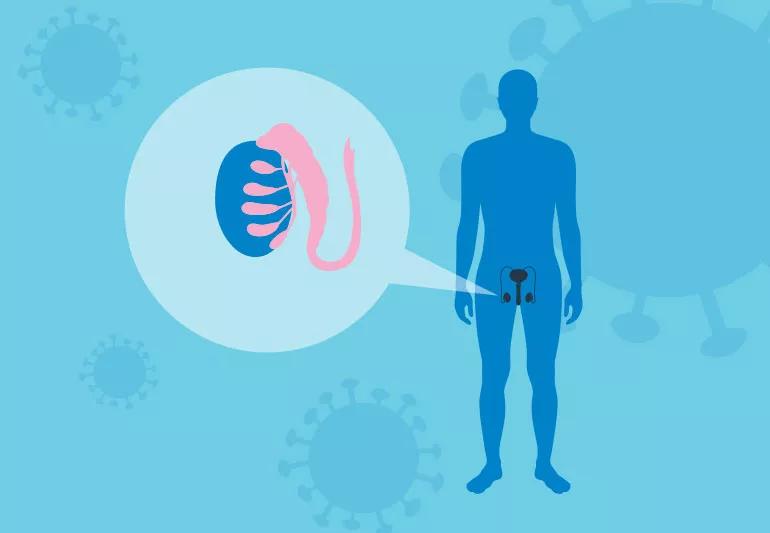Just one more myth to add to the misinformation pile

Image content: This image is available to view online.
View image online (https://assets.clevelandclinic.org/transform/39e98ddd-6422-4dca-9865-53eb2d9afc88/covidTesticles-1132382000-770x533-1_jpg)
covid testicular health
We’ve all come up with some pretty creative reasons for not attending social events. But Nicki’s Minaj’s reason for not attending the Met Gala broke the internet.
Advertisement
Cleveland Clinic is a non-profit academic medical center. Advertising on our site helps support our mission. We do not endorse non-Cleveland Clinic products or services. Policy
Minaj decided to pass on the star-studded event because of its vaccine requirement. She doubled down on her stance by sharing a story about a friend of a cousin who had an “interesting” vaccination experience. According to Minaj, getting vaccinated against COVID-19 caused the man’s testicles to swell up and he was left impotent. He also lost his fiancée because of his ordeal.
This viral urban legend prompted many entertaining responses on social media. It also became yet another thing for healthcare organizations like the CDC to debunk.
So, can COVID-19 vaccines cause testicular problems or erectile dysfunction? Urologist Neel Parekh, MD, helps us sort through this unique tale and explains how vaccination can help protect the male reproductive system.
“There’s more evidence that supports that getting COVID-19 is more harmful than any risks associated with getting vaccinated,” says Dr. Parekh. “So far, none of these studies have shown that the vaccines can cause any negative impact on the male reproductive system.” Dr. Parekh says that this also includes any physical reactions like testicular swelling or shrinkage.
He adds that because of how mRNA vaccines are made, they don’t generate the same type of immune responses as other vaccines can.
Advertisement
“People can experience bad responses to live vaccines. But vaccines like Pfizer’s and Moderna’s are not live virus vaccines. They don’t generate the same sort of response and they don’t integrate into your DNA. Instead, they’re rapidly broken down within your body as soon as they’re administered. So, I don’t see a real mechanism for how these vaccines can cause testicular swelling.”
Dr. Parekh points out that a recent study from the University of Miami’s Miller School of Medicine showed that sperm production was not inhibited by mRNA COVID-19 vaccines.
“They looked at the COVID-19 vaccines and examined semen parameters before and after receiving one. There was no negative impact on sperm parameters or function. Instead, the sperm parameters improved but not significantly. This doesn’t mean that an mRNA vaccine will improve your fertility, but we know it doesn’t hurt it.”
The COVID-19 vaccines have not been linked to erectile dysfunction(ED). However, there seems to be a connection between COVID-19 and ED.
A study out of Italy found that ED can be a short- or long-term complication of COVID-19. This study examined 25 COVID-19-positive males and 75 COVID-negative males. The prevalence of ED was much higher in the participants with COVID-19 (28%) as compared to the participants who didn’t have it (9%). The researchers also stated that “universal vaccination against COVID-19 and personal protective equipment could have the added benefit of preventing sexual dysfunction.”
Dr. Parekh says that coronavirus can cause fertility issues and reduce sperm counts. And cadaver studies that examined people who died from COVID-19 found the virus within the penis along with evidence of ED. Yet more studies still need to be done to find out if the disease can be transmitted sexually.
While there haven’t been any reports of testicular pain or irritation after vaccination, a joint statement from the Society for Male Reproduction and Urology (SMRU) and the Society for the Study of Male Reproduction (SSMR) mentions that about 16% of men in the Pfizer/BioNTech COVID-19 vaccine clinical trial experienced fevers after the second dose. These groups say fevers can cause temporary declines in sperm production. However, the reduction could be similar or less to what could occur if someone became infected with COVID-19.
“More studies need to be done to look at the long-term effects of the vaccines and COVID-19. Based on the studies and literature that are available to us now, there’s no evidence of the COVID-19 vaccines having any negative effect on sexual function or fertility. However, we have a lot more information about how it affects erections and causes fertility issues. Instead of thinking that a vaccine is going to cause problems, think about the negative effects that COVID-19 could have on your health.”
Advertisement
According to Dr. Parekh, ED, testicle pain or irritation could be symptoms of other medical conditions. If you experience any of these, talk to your healthcare provider immediately.
“Testicle swelling could be a sign of a lot more worrisome things. It could be a sign of an STD, an infection or an indicator of testicular cancer. ED could be a sign of heart disease, diabetes or other medical conditions. Men need to voice their concerns to their providers. But they shouldn’t be worried about the vaccines causing these symptoms.”
Advertisement

Sign up for our Health Essentials emails for expert guidance on nutrition, fitness, sleep, skin care and more.
Learn more about our editorial process.
Advertisement
Updated vaccinations are recommended to better protect against the evolving virus
Redness, swelling, itching and rash can happen when your body’s immune system reacts to the vaccine injection
Irregularities in cycle length and flow aren’t a cause for concern
Before you panic, here are the options to consider
Our expert explains why swollen lymph nodes happen
Infants are at high risk of severe RSV, but getting the vaccine during pregnancy helps protect them from it
Chilblain-like skin lesions and rashes are mild (and rare) complications of many viral infections, not just COVID-19
Yes, but symptoms can be easy to miss
Although it could be used as a moisturizer, this new trend is not recommended
Communicating clear limits helps protect your time, energy and emotional well-being
High cholesterol can be genetic, but testing and treatment can lower your heart disease risk